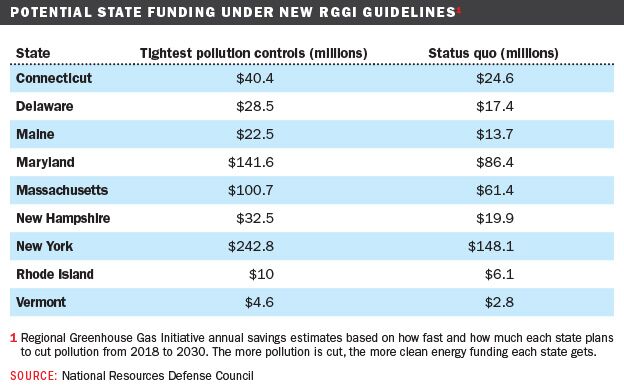New RGGI guidelines could earn Maine up to $22.5M a year in pollution-cutting credits

Maine could stand to earn a maximum of $22.5 million and a minimum of $13.7 million a year through 2030, depending on how much and how fast the state plans to cut pollution in coming years, a recent National Resources Defense Council analysis shows.
Maine and the five other New England states are among the nine states participating in the Regional Greenhouse Gas Initiative, known as RGGI. The nine would gain a total of $3.2 billion in clean energy funding annually by taking the most ambitious power plant pollution cuts now being considered in the next phase of the RGGI program, NRDC found.
RGGI states, which also include Delaware, Maryland and New York, are expected to decide this month how fast and by how much they will cut pollution, and that decision could have a significant impact on the money each state earns under RGGI pollution permit auctions. That money earned in turn can be directed toward clean energy programs to help industry and residents cut their energy bills.
RGGI, launched in 2009, is the first mandatory emissions budget and trading program in the United States for reducing greenhouse gas emissions from the power sector. It is a cap-and-trade system whereby pollution is controlled using a market approach: those emitting more may buy credits from those using less.
Through 2014, Maine directed 98% of its invested CO2 allowance proceeds towards a combination of energy efficiency and direct bill assistance, according to a survey published by RGGI. The Maine Department of Environmental Protection and Efficiency Maine are authorized to use part of the proceeds to support program administration, as well as carbon offsets research. Efficiency Maine is the independent, third-party administrator for all programs in Maine that help promote all-fuels energy efficiency. Over the lifetime of the investments, efficiency programs funded in Maine by RGGI proceeds have conserved over 135,000 MWh of electricity, and lowering participants' energy bills by more than $62 million.
Based on modeling released by the states last month, NRDC's analysis shows the states together could earn $3.2 billion more for their state clean energy programs by selecting the tightest emissions cap under consideration compared to the least ambitious cap option modeled.
Under RGGI, power plants buy permits at quarterly auctions that allow them to emit a specific amount of carbon pollution. Each year, the total amount of pollution — or cap — decreases, as doesthe number of available permits. Permits purchased at auction can also be bought or sold by power plants in secondary markets. The RGGI states then invest the bulk of the auction revenues in energy efficiency, renewable energy, energy bill assistance for low-income consumers and other programs.









Comments